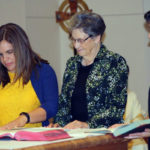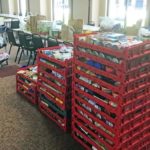By Barb Arland-Fye
Editor
My son Patrick returned home from the Chicago area last Thursday night and called his older brother Colin, a man with autism who converses in Q&A format.

“The first question was, ‘Did you take (Interstate) 88? Did you go past DeKalb?’” Patrick told me. It’s OK to ask questions, but Colin already knows the answers to most of the questions he asks. As recently as a year ago, those questions would have driven Patrick crazy, but not anymore. I’ve noticed a gradual transformation in the relationship between my two sons and I give thanks to God for the change.
Patrick treats Colin with more patience, kindness and respect. Patrick has loved his brother from the beginning, but their interactions didn’t always convey that love. For Patrick, the change in attitude “really kind of happened talking with friends. I matured a little bit, too.” And so has Colin, Patrick added.
You have to understand that Colin doesn’t ask annoying questions on purpose. “He wants reassurance. He wants to hear you answer the questions. He wants to know that everything is going to be AOK,” Patrick said.
Colin is 7-1/2 years older than Patrick, but you wouldn’t know it. “If you think about it, I was going to be the older brother the minute I came into this world,” my younger son said. “Honestly, I am the older brother in a way. I help take care of him. I’ve shown him how to do things.”
Patrick said he used to be jealous of friends with older brothers who taught them how to do things or played on sports teams with them. He’s overcome jealousy because he’s grown to appreciate the preciousness of family.
“We do Sled Hockey together. I think that’s the closest brother time — when we’re on the ice together. I’m skating and he’s in a sled and sometimes I give him a little bit of a push,” Patrick said.
“When Colin plays Challenger baseball, he likes it when I’m out there with Dad. That’s where I learned to be patient, pitching to people. When you’re pitching to someone who has a disability and doesn’t understand he’s supposed to hit the ball, that’s frustrating. …You’re frustrated with yourself for not being able to help them to hit the ball.”
My husband Steve and I have been guilty of instructing Colin what to do when we pick him up from his apartment. “Turn off your lights; turn off your fan; turn off your TV. Unplug your iPad. You don’t need to have those things on while you’re gone.”
But Patrick taught me why Colin will never turn off the lights when he leaves his apartment: “In Mr. Rogers (Neighborhood), the show would always open with Mr. Rogers putting on a sweater and then he would show the trolley going to the Land of Make Believe. I compare that to Colin, when he leaves the trolley, he goes out into the (real) world. When he comes back, the trolley goes back to the Land of Make Believe; that’s Colin’s world. That’s where everything is the way he left it. The lights are on, the iPad is hooked up, and the fan is on. Everything is on. It’s kind of funny. All of the foot rests on his couch are always extended; his blanket is out. It’s his comfort. I think he likes to see where everything is in place.”
From his brother, Patrick said he has learned patience, compassion, fairness and respect for people with disabilities. “God doesn’t discriminate,” Patrick said. On this Thanksgiving Day, I give thanks for an answer to prayer: That my sons will build upon a lifelong, satisfying and fulfilling relationship as brothers who care about one another, look out for one another in a positive way and enjoy one another’s company.
(Editor Barb Arland-Fye can be reached at arland-fye@davenportdiocese.org.)











